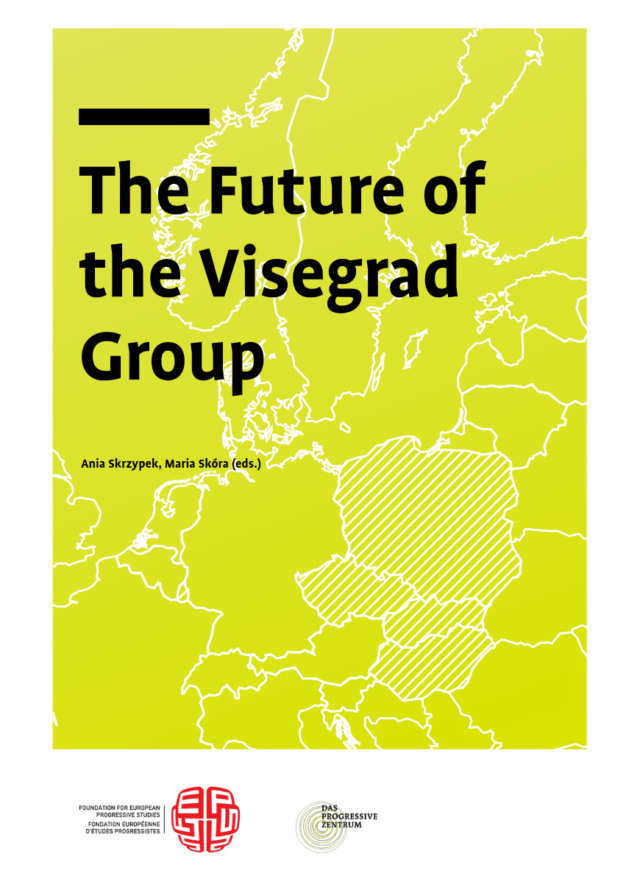Summary
The ebook examines internal developments within the Visegrad Group and sketches scenarios for its engagement at the European level. Distinguished scholars and renowned political figures from the region contributed to this publication, presented jointly by the Foundation for European Progressive Studies and Das Progressive Zentrum.
The ebook examines internal developments within the Visegrad Group and sketches scenarios for its engagement at the European level. Distinguished scholars and renowned political figures from the region contributed to this publication, presented jointly by the Foundation for European Progressive Studies and Das Progressive Zentrum.
The Visegrad Group (V4, consisting of Czech Republic, Hungary, Poland and Slovakia) has been in the European spotlight lately. This once peripheral, regional alliance suddenly proved capable of single-cause impromptu mobilisation within the EU-framework. The ebook „The Future of the Visegrad Group“ explores how sustainable this alliance is and how can it affect the European Union. Thereby, it not only takes stock of the status-quo but also maps out two scenarios about the future course of the Group. After all, many normative questions demand answers since the European community has been facing a “polycrisis”, lacking a consent on which principles it should follow.
The publication is the product of a joint initiative by the Foundation for European Progressive Studies (FEPS), and the Berlin-based think tank Das Progressive Zentrum. It aimed to capture the diversity of the region and provide fresh, creative insights. Thanks to the engagement of distinguished scholars and renowned political figures from the region, this collection presents a more holistic, trans-regional reflection on the Visegrad Group in the European context.
The editors hope that this book will help better understand the positions and interests of the four younger member states in question – for the benefit of the whole European Community.
Contents Overview
I. Mapping the Interests within the V4
- Czechia: From a V4-Enthusiast to a V4-Sceptic and Back Again
by Tereza Novotná, Zuzana Stuchlíková - Hungary and the Visegrad Four
by Tamás Boros - Poland’s European Policy – Drafting Away From the Mainstream
by Agnieszka Łada - Slovakia: Squaring the Visegrad Circle
by Radovan Geist
II. Future Scenarios for the V4
- Diverging Visions for Europe: EU and Visegrad Group at the Midterm of Legislative Period 2014 – 2019
by Ania Skrzypek - Lessons from 26 years of Visegrad’s History
by Ireneusz Bil
III. Possible Progressive Alliances
- Czechia: The Rise of Populism and the Crisis of Identity of Centre-Left
by Miroslav Poche - The State of Progressive Ideas in Hungary
by Ildiko Lendvai - Opinion on the Left in Poland
by Sławomir Wiatr and Przemysław Potocki - Slovak social democracy: focus on social issues
by Ľuboš Blaha
IV. Epilogue
- The Future of V4: Where Have All the Progressive Ideas Gone and When Will They Come Back?
by Andrea Pető
Background of the Visegrad Project
Here you can learn more about our thematic V4 roundtables held in 2017 in Berlin and in Brussels.
“The Future of the Visegrad Group” is a joint project of Das Progressive Zentrum and the Foundation for European Progressive Studies.
Authors
New Progressive Ostpolitik for Europe
The European Election 2019: A Comparative Outlook at the European Election Campaigns in France, Germany and Poland
EU-Streit mit Ungarn: Wie geht es weiter?

Content

Wir entwickeln und debattieren Ideen für den gesellschaftlichen Fortschritt – und bringen diejenigen zusammen, die sie in die Tat umsetzen. Unser Ziel als Think Tank: das Gelingen einer gerechten Transformation. ▸ Mehr erfahren


